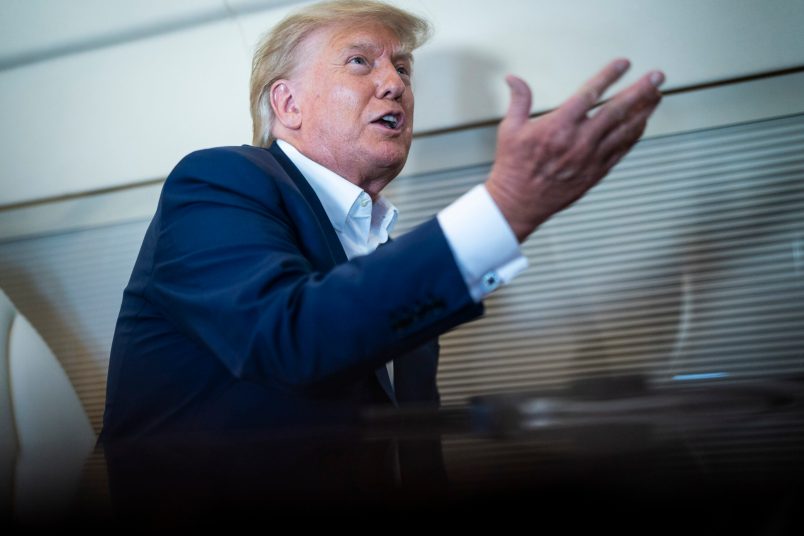I’ve only gotten a couple negative replies to the post below about Alvin Bragg’s expected indictments of ex-President Trump. But those replies have had a wild intensity that started me thinking about what the possible disconnect was between me and these readers. What I said was that it’s not great. But it’s happening entirely outside any framework that any of us can do anything about. And, mostly, I don’t think it will matter much one way or another if, as I expect, it is followed by indictments for graver crimes. In fact, even if this is the only Trump indictment ever, I still don’t think it matters much.
People just see things differently of course. And intense disagreement is nothing new to me. But I think there’s something more going on here — or two things rather. And, because I think these few TPM Readers represent a lot more people who think the same way, here’s what I think those things are.
Some people think indictments of Donald Trump are a make-or-break thing for the future of the country. Among other things, they could be what blocks his path back to the White House in 2024. So getting it all arranged just right couldn’t be more important. But that’s misguided. Holding Trump accountable, especially for his actions surrounding January 6 and the events in Georgia, is very important. Judicial accountability is how a country speaks to itself about what is acceptable and what is not. But that means bringing indictments. We can’t control whether juries will find him guilty. And we certainly can’t control how the country at large will react to the prosecution of a former President.
The thing that is going to stop ex-President Trump from returning to the White House is voters refusing to vote for him. Indictments and prosecutions can play a role in that inasmuch as they are the society communicating to itself what is okay and what is not. The January 6 hearings played some of this role in the 2022 elections. But they operate that way only if there is an underlying belief in the population which charges underline and confirm. They can play a role in shaping public opinion but they are no replacement for an election. They are not a judicial deus ex machina which removes Trump from the scene. Expecting them to be is a big mistake. Judicial accountability for the past and an election about the future are two things that may influence each other. But they’re fundamentally two separate things running in parallel.
The other thing is something more fundamental about what you control and what you don’t. I see a lot of people who get very wound up about their people needing to get everything inflected and pitched just right not only so that no one gets the wrong impression but so that no bad people will claim you meant something you didn’t. If it’s a political campaign, which this isn’t, everybody needs to produce messages that are as clear and effective as possible. But there is a certain point where you have to recognize that you cannot control what everyone thinks or says or how they react.
Some of this tendency came out during Trump’s two impeachment trials. It was an inherently frustrating process since the de facto judge in the first trial, the GOP Senate majority, was absolutely committed to acquitting Trump no matter what. But the basic dynamic was the same in both trials. This prompted a wave of anger and second-guessing about the case brought by the House impeachment managers. (I confess to doing some myself.) If only they’d taken things to the next level, made a more piercing or overwhelming case, the outcome might have been different. Few people made this argument fully explicit. Because once seen in the cold light of day it was clear there was no argument, no new facts, no anything that would convince Republicans to convict Trump at trial. But even if few could defend the argument, lots of people felt it, and strongly.
At a certain point we all need to recognize which things we control and which we do not and frame our expectations and actions accordingly. That’s not settling or lowering expectations. It’s just a proper way to live in the world. The issue in the impeachment trials wasn’t how good the Democrats’ arguments were. It was Republicans’ absolute commitment to defending Trump no matter what. Once you realize this, it’s clarifying and even liberating. You understand what you’re actually trying to do. The contrary impulse led a lot of Democrats and a seemingly endless number of pundits to enthrall themselves in tales of Democrats’ fecklessness and impotence. Failure after failure! They can’t get the job done!
Recognizing what you control and what you don’t isn’t a matter of letting yourself off easy. It’s a way to remain sane and not demoralized or enervated by the hopeless folly of trying to control everything.
The importance of prosecuting Donald Trump isn’t any vain hope that it cuts short or removes the requirement of defeating him and anyone who would take his place at the ballot box. It’s rather that in our society, when people commit crimes they get prosecuted for it. While there may be a place for some forbearance for former Presidents, if a President can commit crimes of such a brazen and grave character with no response we are truly saying that Presidents have impunity and are above the law. And that is something we should not allow. It simply cannot be the case that Trump is such an habitual criminal that the political opposition is at fault or on the line for the fact that he might be prosecuted first for one of his lesser crimes. It’s too much to ask.






